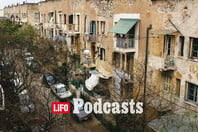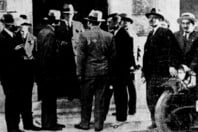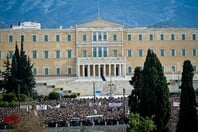Δεν διαφωνώ στο ότι θα κοιτούσαν που κείτονται τα συμφέροντά τους και γιατί να μην το κάνουν άλλωστε; Μέχρι τους Βαλκανικούς η Ελλάδα έφτανε ως την ...Καλαμπάκα, αλλά και κατόπιν η πληθυσμιακή σύνθεση [αν δούμε χάρτη του '18 της (ελληνικής) Mακεδονίας, του Σέρβου Cvijić https://www.bl.uk/voices-of-science/sitecore/content/home/collection-items/ethnographical-map-balkan-peninsular(κι όχι μόνον αυτόν, βεβαίως)] δείχνει ότι το μεγαλύτερο κομμάτι -πλην της Χαλκιδικής- κατοικείται από μη ρωμιούς. Γιατί θα έπρεπε να θεωρείται δεδομένο ότι θα συνταχτούν με μία "ρωμιοσύνη", που δεν είχε πολλούς λόγους να τους συμπαθεί; Αυτό που θέλω να πω είναι πως όλες οι χώρες και δυνάμεις της περιοχής (συμπεριλαμβανομένης ΚΑΙ της Ελλάδος) φαίνεται να είχαν συγκεκριμένα συμφέροντα, στους εκάστοτε συσχετισμούς και πληθυσμούς. Αν δηλαδή την Ελλάδα την συνέφερε, τότε, π.χ. να ενισχύσει την "διαφορετικότητα" των σλαβόφωνων, επί ελληνικού (τελικά) εδάφους έναντι στους Βούλγαρους, αλλά αυτό μπορεί μετά από Χ χρόνια να γυρίσει μπούμερανγκ στην Ελλάδα επειδή άλλαξαν/ θα αλλάξουν οι συσχετισμοί, δεν είναι -προφανώς- αποκλειστική ευθύνη των άλλων, ούτε πρέπει να προκαλεί αντιδράσεις ..."ααααα! βοήθεια ένα ελάφι στον ώμο μου!όλοι τα έκαναν αυτά..."Neither the first nor the second of these catastrophes had significantly affected the Macedonian Slavs' sense of their national identity, which remained predominantly Bulgarian. Not so the third catastrophe: the Balkan Wars of 1912-1913. These put an end to Ottoman rule, but left the bulk of Macedonia, and its Slav population, partitioned between Serbia and Greece. Only a small portion of the territory and population went to Bulgaria. This territorial verdict was confirmed at the end of the First World War, exposing the national identity of a majority of the Macedonian Slavs to sustained assaults. Within Greece, and also within the new kingdom of Yugoslavia, which Serbia had joined in 1918, the ejection of the Bulgarian church, the closure of Bulgarian schools, and the banning of publication in Bulgarian, together with the expulsion or flight to Bulgaria of a large proportion of the Macedonian Slav intelligentsia, served as the prelude to campaigns of forcible cultural and linguistic assimilation. Within Greece, the Macedonian Slavs were designated "Slavophone Greeks", while within Yugoslavia, they were officially treated as "South Serbs". In both countries, schools and the media were used to disseminate the national ideologies and identities, and also the languages, of the new ruling nations, the Greeks and the Serbs. These cultural measures were reinforced by steps to alter the composition of the population: Serb colonists were implanted in Yugoslav Macedonia, while in Greek Macedonia, the mass settlement of Greek refugees from Anatolia definitively reduced the Slav population to minority status. In both countries, these policies of de-bulgarisation and assimilation were pursued, with fluctuating degrees of vigour, right through to 1941, when the Second World War engulfed the Balkan peninsula."...Within Greece, the Macedonian Slavs (Μacedonian Bulgarians?) were designated "Slavophone Greeks"[Άσχετο που τα Βουλγάρικα, όπως και τα Σερβο-Κροάτικα (και τα Μακεντόνσκι) ανήκουν στις Νότιες Σλαβικές γλώσσες]
























